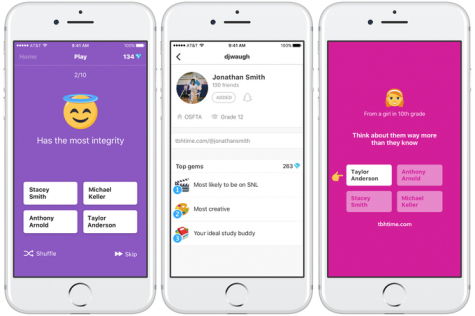Left To Their Own Devices
As technology becomes more prominent in student lives, addiction creeps in
Teachers persist with their no phones policy, but evidence suggests it may be getting harder for students to comply.
The Huffington Post Article “Is Your Child Addicted to Electronics?” states that “heavy exposure to TV or other rapid-paced media may rewire kid’s brains to crave constant stimulation.” As a result, activities that require constant attention, such as reading or doing homework, become more difficult to accomplish.
Senior Alexandra Strong uses her phone all the time. “Just to know where anybody is, or so I could call somebody if they need anything,” she said.
Her explanation is not unusual.
A 2015 report by Common Sense Media finds that “teenagers (ages 13-18) use an average of nine hours of entertainment media per day and that tweens (ages 8-12) use an average of six hours a day, not including time spent using media for school or homework.”
“I probably spend, like, six hours on electronics, but four hours on my phone” every day, freshman Grace Kerns said. “I think of it as a necessity, even though it definitely isn’t. I would probably be really upset if I didn’t have it every day.”
Homework in today’s school environment requires the use of technology, but technology often hurts more than it helps. Jonathan Suna is one of many who struggle with their educational use of technology. “We have a love-hate relationship. It’s helpful, but when I’m studying and I have my phone, I go at a snail’s pace. It just distracts me so much,” he said.
“I would say I’m not exactly addicted, but if I can’t find it I’ll freak out,” junior Margaret Cook said about her phone. “I need it most times just to stay in contact with my parents and my family, but also just to keep up on social media.”
The Huffington Post article also cited dopamine as a cause of electronic addiction. Dopamine is a chemical in the brain that acts as a reward system. Whenever a new notification comes in or another person likes that Instagram photo, dopamine releases in the brain, creating a subtle, yet addictive, pleasure response.
However, senior Lauryn Hobbs is optimistic about the integration of technology into student’s everyday lives. “I think it’s still good, though,” she said. “Our parents overreact and they say we’re on it too much because back in the day they didn’t have anything and that was just boring.”
Sophomore Allison Stewart said that the amount of time teenagers spend on electronics is “so bad when you think about it.”
Journalism I Reporters Emet Celeste-Cohen and Ellie Vahey contributed reporting to this article







